

Climate Change Is Making Wildfires Worse. CO2 emissions stall thanks to China's passion for renewables - environment - 17 June 2015. The energy field is changing (Image: Jerry Ojang/Getty) New energy policies in China are being heralded as the source of a potentially historic break in the link between global economic growth and rising carbon dioxide emissions.

Last year, carbon emissions were unchanged even as the global economy grew by 3 per cent compared with 2013, according to a report by Renewable Energy Policy Network for the 21st Century (REN21), a think tank linked to the UN Environment Programme. Explicit cookie consent. GREEN-FINGERED folk who invested in British forests over the past decade did better, on average, than those who planted their cash in more obvious places, such as stocks and bonds.
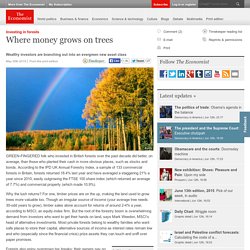
According to the IPD UK Annual Forestry Index, a sample of 133 commercial forests in Britain, forests returned 18.4% last year and have averaged a staggering 21% a year since 2010, easily outgrowing the FTSE 100 share index (which returned an average of 7.7%) and commercial property (which made 10.9%). Why the lush returns? New Report: March 2015 Easily Set The Record For Hottest March Ever Recorded. By Joe Romm Posted on Share this: "New Report: March 2015 Easily Set The Record For Hottest March Ever Recorded" Share:

5 Key Takeaways From the Latest Climate Change Report. The latest report from the main international panel charged with assessing climate change, released today in Copenhagen, shouts the same basic message scientists have been telling governments for decades.
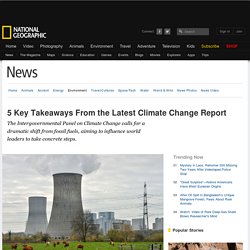
Protecting the planet will require a dramatic shift away from fossil fuels, the report from the Intergovernmental Panel on Climate Change emphasizes. The release was timed for political impact, arriving weeks before international negotiators meet in Lima, Peru, to start forging a new strategy on climate change. "Science has spoken. There is no ambiguity in their message," United Nations Secretary-General Ban Ki-moon said in a news conference this morning in Copenhagen. Cgiarclimate : Latest #IPCC predicts that... Climate Change Isn’t Main Culprit in Decline of Coral Reefs: Report.
July 10, 2014 | 3:43 pm | Print By the Caribbean Journal staff Just one-sixth of the original coral cover in the Caribbean remains.
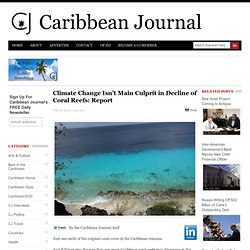
Climate change making droughts in Australia worse as rain patterns shift. Climate change is making drought conditions in south-west and south-east Australia worse, with serious ramifications for people’s health and the agriculture industry, a new paper has warned.
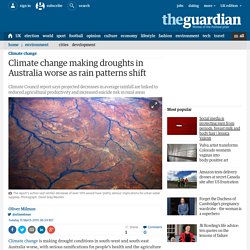
The Climate Council report states that since the mid-1990s, south-east Australia has experienced a 15% drop in rainfall during late autumn and early winter, with a 25% slump in average rainfall in April and May. A drought that has gripped western Queensland and northern New South Wales since 2012 has put pressure on farmers and forced wildlife into starvation. Projected decreases in average rainfall in winter and spring mean it will “likely be increasingly difficult to erase such rainfall deficits in the future” according to the Climate Council report, which cites data from the CSIRO and Bureau of Meteorology. The Climate Council said that increasingly severe droughts were linked to a drop in agricultural productivity and a 15% increase in suicide risk for rural males aged between 30 and 49. Climate Change Study Finds U.S. Is Already Widely Affected. The effects of human-induced climate change are being felt in every corner of the United States, scientists reported Tuesday, with water growing scarcer in dry regions, torrential rains increasing in wet regions, heat waves becoming more common and more severe, wildfires growing worse, and forests dying under assault from heat-loving insects.
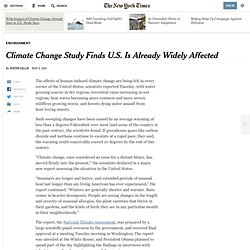
Such sweeping changes have been caused by an average warming of less than 2 degrees Fahrenheit over most land areas of the country in the past century, the scientists found. If greenhouse gases like carbon dioxide and methane continue to escalate at a rapid pace, they said, the warming could conceivably exceed 10 degrees by the end of this century. “Climate change, once considered an issue for a distant future, has moved firmly into the present,” the scientists declared in a major new report assessing the situation in the United States. Clock Ticking To Stop Climate Change, Warns UN. The world faces "severe, pervasive and irreversible" damage unless swift action is taken to switch to fossil fuel alternatives and cut carbon emissions, according to the most detailed climate change report in years.
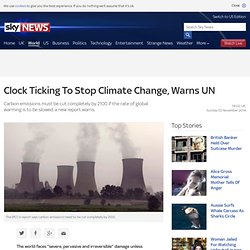
"A window of opportunity" to limit global warming to 2C (3.6F) is closing, according to UN experts. They warn that if targets are not met, more extreme weather events will occur, and the problem will become more expensive to solve. Right now, levels of three greenhouse gases – methane, nitrous oxide and carbon dioxide – are at unprecedented levels that haven't been seen in the past 800,000 years.
To slow down permanent increases in global temperatures, carbon emissions need to be reduced by between 40% and 70% by 2050, and completely eliminated by the end of the century, according to the UN's Intergovernmental Panel on Climate Change (IPCC). "Mitigation cost estimates vary, but … global economic growth would not be strongly affected. " EU leaders agree CO2 emissions cut. 24 October 2014Last updated at 02:19 ET Poland, heavily reliant on coal, fears the cost of lower CO2 emissions will harm its economy EU leaders have reached a landmark deal to cut greenhouse emissions by 40% by 2030, compared with 1990 levels.
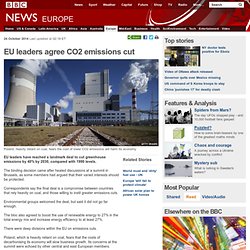
Explicit cookie consent. Global Warming or Global Governance? (Full Length) Global warming slowdown 'could last another decade' 21 August 2014Last updated at 14:45 ET By Matt McGrath Environment correspondent, BBC News Currents in the Atlantic could be responsible for a slowdown in temperature rises The hiatus in the rise in global temperatures could last for another 10 years, according to new research.
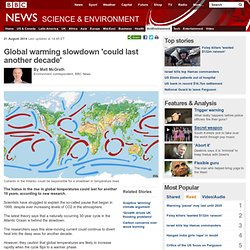
Scientists have struggled to explain the so-called pause that began in 1999, despite ever increasing levels of CO2 in the atmosphere. The latest theory says that a naturally occurring 30-year cycle in the Atlantic Ocean is behind the slowdown. Hockeyschtick1 : "State Of The Climate Report"... IPCC: rapid carbon emission cuts vital to stop 'severe' impact of climate change. Climate change is set to inflict “severe, widespread, and irreversible impacts” on people and the natural world unless carbon emissions are cut sharply and rapidly, according to the most important assessment of global warming yet published. The stark report states that climate change has already increased the risk of severe heatwaves and other extreme weather and warns of worse to come, including food shortages and violent conflicts. But it also found that ways to avoid dangerous global warming are both available and affordable.
“Science has spoken. John Thorpe sur Twitter : "@afneil You mean like this? Michael E. Mann sur Twitter : ""2014 was hottest year on record globally, by far" via @ClimateProgress: #FauxPause" Newscientist : Global warming will boost urban ... Nytimes : The Big Melt Accelerates ... Obama unveils tough new regulations to combat carbon pollution – live. Right Relevance: Search or Login for deep topical relevance.
Right Relevance: Search or Login for deep topical relevance. The Arctic Ocean: Awakening. A daily record of atmospheric carbon dioxide from Scripps Institution of Oceanography at UC San Diego. The top ten global warming 'skeptic' arguments answered. Global temperatures are rising, and the top 10 climate contrarian explanations are not good. Photograph: Aaron Tilley for the Guardian Roy Spencer is one of the less than 3% of climate scientists whose research suggests that humans are playing a relatively minimal role in global warming. These are the countries most at risk from a climate change 'apocalypse' These maps claim to show which countries would be most vulnerable in the event of the effects of climate change reaching life-threatening levels - if they already haven’t.
They were compiled using the ND-Gain Index, a project of the University of Notre Dame, in Indiana in the US. The index is built on two variables, vulnerability and readiness, and has been monitoring countries since 1995. The UK is seventh-best equipped to deal with the aftershock of climate change reaching its tipping point, behind mostly Scandinavian countries. Countries most at risk meanwhile are in Central America, South Asia and sub-Saharan Africa. Weather_king : 5 month period Jan-May 2014 ...